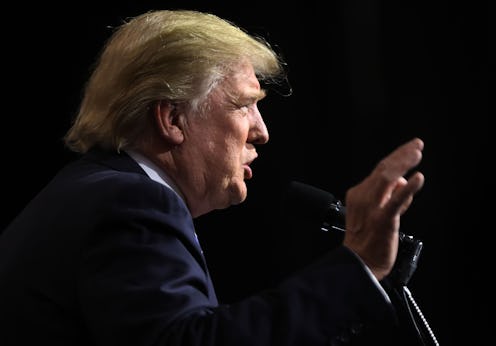Life
How Toxic Masculinity Took Over 2016
At this point, it should be common knowledge that feminism doesn't benefit only women; it aims to help everyone. In case you needed a reminder that, for example, men are equally constrained by patriarchal ideals, the Representation Project's latest video is a great place to start. "How Toxic Masculinity Dominated 2016" examines the way the toxic variety of masculinity that's often perpetuated by the patriarchy influenced the events of this year — and trust me: The video will be simultaneously the most depressing and infuriating three minutes of your day.
If you're unfamiliar with the term, you'll be able to recognize its effects. Broadly speaking, toxic masculinity is the rigid set of social norms that require men to be stoic, aggressive, and dominant — characteristics that aren't necessarily conducive to a healthy lifestyle. When they're imposed on society, they create a culture in which violence is prized, women and LGBTQ people are seen as inferior, and men are discouraged from expressing — or even simply experiencing — any "feminine" emotions.
The most obvious example of toxic masculinity in 2016 was the presidential election that dominated the news cycle. Throughout his campaign, Donald Trump demonstrated an utter lack of respect for women, particularly his opponent, Hillary Clinton. Sometimes, it was so cartoonish it was almost funny; in the second debate, his creepy hovering behind Clinton spawned meme after hilarious meme. Taken altogether, however, Trump's treatment of women and people of color is more than a little terrifying, and as the Representation Project's video points out, much of his behavior is rooted in toxic masculinity.
"Toxic masculinity threatens," the video reads as a precursor to a series of clips from Trump's presidential campaign. At one point in the video, Trump states women should be punished for receiving abortions; at another, he promises to sue the women who accused him of sexual assault. (He has denied these allegations.) When viewed one after another, the clips of his campaign depict a clear attempt to assert dominance over women and people of color.
However, the video doesn't restrict itself to the presidential election. It touches on a few high-profile cases of sexual assault this year, beginning with Brock Turner, the former student who served just three months in jail for three counts of sexual assault. The entire trial was a lesson in rape culture, but perhaps the most painful expression of toxic masculinity was made by Turner's father when he referred to the assault as "20 minutes of action."
The video also draws a connection between toxic masculinity and the violent acts that took place across America this year, including police brutality and the Orlando shooting that killed 49 at Pulse nightclub. It's a conclusion echoed by Salon writer Amanda Marcotte, who wrote after the Pulse massacre, "Our national attachment to dominance models of manhood is a major reason why we have so much violence."
The Representation Project is a nonprofit organization dedicated to highlighting the underrepresentation of women in many areas of society and identifying the limitations of gender norms. (You might recognize the Representation Project from its famous first film, Miss Representation.) To see more from the organization, head over to its website. In the meantime, do what you can to call out toxic masculinity when you see it — something tells me there's going to be plenty of material in 2017.
Image: The Representation Project/YouTube
